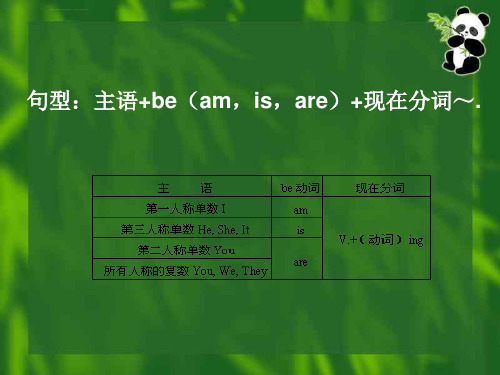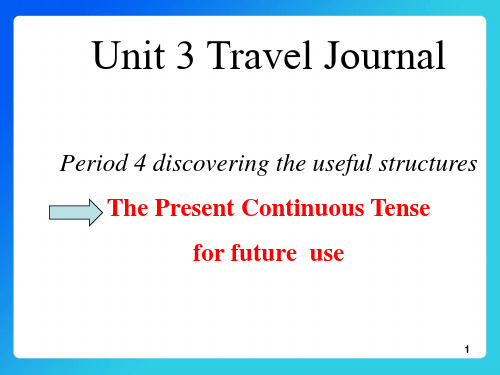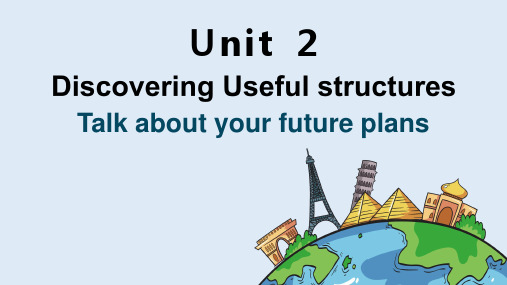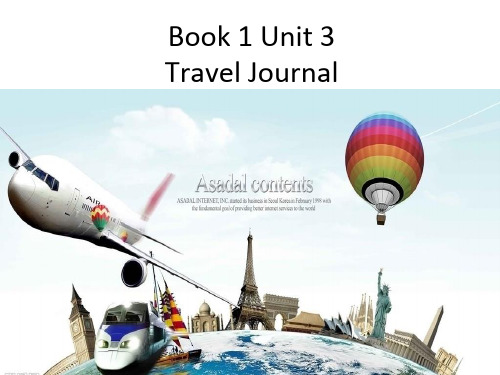高中英语语法 现在进行时表将来(29页PPT)
合集下载
语法-进行时表将来ppt课件.ppt

1.The building___C____ , I can't stand its noise.
A. builds
B. is built
C. is being built D. was being built
2. I can't catch up with the fashion, because
1,说话时正在进行的动作 或所处状态
*The telephone is ringing, would you answer it, please? *What are you doing? * I’m writing a letter. 常与now ,right now, at present , at the moment , these days等时间状语连用
3,现在时表将来。a.表示即将发生的或预定中 病原体侵入机体,消弱机体防御机能,破坏机体内环境的相对稳定性,且在一定部位生长繁殖,引起不同程度的病理生理过程 计划好的活动。现在进行时表示将来时,即表示 按计划或安排在最近将要进行的动作。 这种用法比较生动,给人一种期待感。 它常表示最近或较近的将来,
* I want to know when he ___B____ for New York tomorrow. A. has left B. is leaving C. had left D. has been leaving
• He___B____ of how he can do more for the people.
is no easy task because technology ____A___ so rapidly.
A. is changing B. has changed C. will have changed D. will change 3 Rainforests ____C___ and burned at such a
A. builds
B. is built
C. is being built D. was being built
2. I can't catch up with the fashion, because
1,说话时正在进行的动作 或所处状态
*The telephone is ringing, would you answer it, please? *What are you doing? * I’m writing a letter. 常与now ,right now, at present , at the moment , these days等时间状语连用
3,现在时表将来。a.表示即将发生的或预定中 病原体侵入机体,消弱机体防御机能,破坏机体内环境的相对稳定性,且在一定部位生长繁殖,引起不同程度的病理生理过程 计划好的活动。现在进行时表示将来时,即表示 按计划或安排在最近将要进行的动作。 这种用法比较生动,给人一种期待感。 它常表示最近或较近的将来,
* I want to know when he ___B____ for New York tomorrow. A. has left B. is leaving C. had left D. has been leaving
• He___B____ of how he can do more for the people.
is no easy task because technology ____A___ so rapidly.
A. is changing B. has changed C. will have changed D. will change 3 Rainforests ____C___ and burned at such a
高中英语语法 现在进行时表将来PPT

The Present Continuous Tense for Future Actions
Step 1
1) Marry is leaving for Beijing by plane tomorrow.
2) Bob is going to the airport by taxi next week.
高中英语语法 现在进行时表将来(共29张PPT)
高中英语语法 现在进行时表将来(共29张PPT)
(3) 表示不久之后肯定发生,或按计划、 安排将要做的事,常与未来的时间状语 连用,动词多是表示位移的,如come, go , leave, arrive, start, begin等 Mother is taking us home on Sunday. 星期天母亲将带我们回老家。
高中英语语法 现在进行时表将来(共29张PPT)
高中英语语法 现在进行时表将来(共29张PPT)
Translate the following statements: 1. 我下个月将去美国。 —I a—m—go—in—g t—o A—m—er—ic—a n—ex—t m—o—nt—h.— 2. 我姑姑在信上说她后天将到我们家。 _M_y__au_n_t_s_a_i_d_s_h_e_i_s _a_rr_i_v_in_g_a_t_o_u_r_h_o_m__e — the—d—ay—af—ter—to—m—or—ro—w—in—th—e l—ett—er—. —
高中英语语法 现在进行时表将来(共29张PPT)
高中英语语法 现在进行时表将来(共29张PPT)
表示将来时态的其它方法:
will/shall+动词原形,表示将来某个时间 要发生的动作或存在的状态;或表示自然 趋势或非主语意志。 He will write you a letter next week. I shall be sixteen years old next month.
Step 1
1) Marry is leaving for Beijing by plane tomorrow.
2) Bob is going to the airport by taxi next week.
高中英语语法 现在进行时表将来(共29张PPT)
高中英语语法 现在进行时表将来(共29张PPT)
(3) 表示不久之后肯定发生,或按计划、 安排将要做的事,常与未来的时间状语 连用,动词多是表示位移的,如come, go , leave, arrive, start, begin等 Mother is taking us home on Sunday. 星期天母亲将带我们回老家。
高中英语语法 现在进行时表将来(共29张PPT)
高中英语语法 现在进行时表将来(共29张PPT)
Translate the following statements: 1. 我下个月将去美国。 —I a—m—go—in—g t—o A—m—er—ic—a n—ex—t m—o—nt—h.— 2. 我姑姑在信上说她后天将到我们家。 _M_y__au_n_t_s_a_i_d_s_h_e_i_s _a_rr_i_v_in_g_a_t_o_u_r_h_o_m__e — the—d—ay—af—ter—to—m—or—ro—w—in—th—e l—ett—er—. —
高中英语语法 现在进行时表将来(共29张PPT)
高中英语语法 现在进行时表将来(共29张PPT)
表示将来时态的其它方法:
will/shall+动词原形,表示将来某个时间 要发生的动作或存在的状态;或表示自然 趋势或非主语意志。 He will write you a letter next week. I shall be sixteen years old next month.
现在进行时表将来通用课件

特点
使用现在进行时表达未来的动作 或状态,强调该动作或状态即将 发生。
与其他时态的区别
与一般现在时的区别
一般现在时表示现在发生的动作或状 态,不涉及未来。
与一般将来时的区别
一般将来时明确表示未来的动作或状 态,与现在时间没有直接联系。
使用的情境与场合
计划安排
表达即将发生的动作
当计划在未来某个时间点进行某个动 作或事件时,可以使用现在进行时表 将来。
示例 They are getting married next month.(他们下个月结 婚。)
表示预测或推断的动作
01
总结词
这个时态用于描述基于当前情况或常识的预测或推断,通常表示一种可
能性或趋势。
02 03
详细描述
现在进行时可以表示基于当前情况或常识的预测或推断,通常表示一种 可能性或趋势,如“The weather is getting warmer, so spring is coming”(天气越来越暖和,所以春天来了)。
在学术活动的日程安排或会议议程中,现在进行时可以用来表示未来的计划或活动,例如 “会议正在安排在周三上午9点开始”。
在商务沟通中的应用
商务计划和报告
在制定商业计划或撰写商业报告 时,可以使用现在进行时来描述 未来的目标、计划或预期成果, 例如“公司正在制定下一财年的 销售目标”。
会议和谈判
在进行商务会议或谈判时,现在 进行时可以用来表达即将讨论的 议题或即将达成的协议,例如“ 我们正在讨论合作的具体细节”。
在日常交流中的应用
日常闲聊
在非正式的日常闲聊中,人们常常使用现在进行时来表达即将发 生的事情,例如“我们正在去公园”表示即将去公园。
安排和计划
使用现在进行时表达未来的动作 或状态,强调该动作或状态即将 发生。
与其他时态的区别
与一般现在时的区别
一般现在时表示现在发生的动作或状 态,不涉及未来。
与一般将来时的区别
一般将来时明确表示未来的动作或状 态,与现在时间没有直接联系。
使用的情境与场合
计划安排
表达即将发生的动作
当计划在未来某个时间点进行某个动 作或事件时,可以使用现在进行时表 将来。
示例 They are getting married next month.(他们下个月结 婚。)
表示预测或推断的动作
01
总结词
这个时态用于描述基于当前情况或常识的预测或推断,通常表示一种可
能性或趋势。
02 03
详细描述
现在进行时可以表示基于当前情况或常识的预测或推断,通常表示一种 可能性或趋势,如“The weather is getting warmer, so spring is coming”(天气越来越暖和,所以春天来了)。
在学术活动的日程安排或会议议程中,现在进行时可以用来表示未来的计划或活动,例如 “会议正在安排在周三上午9点开始”。
在商务沟通中的应用
商务计划和报告
在制定商业计划或撰写商业报告 时,可以使用现在进行时来描述 未来的目标、计划或预期成果, 例如“公司正在制定下一财年的 销售目标”。
会议和谈判
在进行商务会议或谈判时,现在 进行时可以用来表达即将讨论的 议题或即将达成的协议,例如“ 我们正在讨论合作的具体细节”。
在日常交流中的应用
日常闲聊
在非正式的日常闲聊中,人们常常使用现在进行时来表达即将发 生的事情,例如“我们正在去公园”表示即将去公园。
安排和计划
高二英语课件必修现在进行时表将来

添加 标题
描述未来可能性或假设:如“If the weather stays fine, we might go for a picnic this weekend.”
添加 标题
在 新 闻 标 题 中 使 用 : 如 “ Bre x i t Ta l k s to Resume Next Week”
添加标题
添加标题
添加标题
添加标题
现在进行时表将来通常用于表示 计划、安排、打算等,而将来进 行时通常用于表示预测、推测等。
现在进行时表将来表示的是一次 性的动作或状态,而将来进行时 表示的是持续性的动作或状态。
现在进行时表将来在哪些情况下不适用?
当句子中有明确的时间状语时,如“明天”、“下周”等,通常不使用现在进行时表将来。
结构和特点
现在进行时表将来的基本结构:主语+be+doing+future 特点:表示将来计划或安排的动作或状态 例子:I am going to the cinema tonight. 与一般将来时的区别:现在进行时表将来更强调计划性和确定性
添加标题 添加标题 添加标题 添加标题 添加标题 添加标题
现在进行时表将 来可以表示将来 发生的动作或状 态,而一般现在 时不能表示将来 发生的动作或状 态。
现在进行时表将来与将来进行时的区别是什么?
现在进行时表将来表示的是将来 某一时刻正在进行的动作或状态, 而将来进行时表示的是将来某一 时刻将要进行的动作或状态。
现在进行时表将来的结构是 “will be + 动词ing”,而将来 进行时的结构是“will + 动词原 形”。
现在进行时表将来的实际应用
在旅游英语中的应用
询问行程:"Are you going to visit the Great Wall tomorrow?"
现在进行时表将来ppt课件

here? —I _w_i_ll_r_e_tu_r_n(return)home and __g_e_t__(get)a job.
3. I _a_m__w_r_i_ti_n_g_(write) the composition tonight.
4. Mary’s birthday is next Monday, her mother is going to give
Sr: Well, it sounds fun. I hope you’ll have a pleasant journey. Thank you for11your
用现在进行时表示将来: (1) 指的是近期的,按计划或安排要发生的动作;
常有“意图”“安排”或“打算”的含义;感觉比较 生动,给人一种期待感。
• Revision of the Present Continuous Tense, and the Simple Future Tense.
18
Homework
1.Do Ex 1 and 2 in the Using structures on page 57 -- page 58. You are asked to write your plan for a trip by discussing with your partners.
来
Where are you staying ?
How are you going to…?
How long are you staying in…?
When are you arriving in/at…?
When are you coming back?
8
Journey down the Mekong
动作,不与表示将来的时间状语连用。
3. I _a_m__w_r_i_ti_n_g_(write) the composition tonight.
4. Mary’s birthday is next Monday, her mother is going to give
Sr: Well, it sounds fun. I hope you’ll have a pleasant journey. Thank you for11your
用现在进行时表示将来: (1) 指的是近期的,按计划或安排要发生的动作;
常有“意图”“安排”或“打算”的含义;感觉比较 生动,给人一种期待感。
• Revision of the Present Continuous Tense, and the Simple Future Tense.
18
Homework
1.Do Ex 1 and 2 in the Using structures on page 57 -- page 58. You are asked to write your plan for a trip by discussing with your partners.
来
Where are you staying ?
How are you going to…?
How long are you staying in…?
When are you arriving in/at…?
When are you coming back?
8
Journey down the Mekong
动作,不与表示将来的时间状语连用。
现在进行时表将来课件

1. We are waiting for you now.
此时此刻正在进行的动作
2. I'm doing my homework now.
3. She is learning to swim recently. 表示现阶段在做的动作 4. We are working on a farm these days.
3. Read the sentences and tick those that express future tense. Rewrite them in the present continuous tense.
__✓__ I 've just booked my air ticket! I'll visit my grandparents
My best friend is to be married in November this year. You are to be back by 9. Your plan is to be a failure. Fish __is__to______die without water.
5. be about to do 表将来
(1) 位移动词的进行时表示将来时 现在进行时表示将来,主要表示按计划或安排要发生的事。此时所 使用的动词多是表示位置移动的动词(词组), 如: come ,go off, leave , arrive, fly, start, travel, walk, ride, drive , take off 等。
5. I am leaving for Beijing next week. 表示即将发生的动作 6. I'm coming to Shanghai next Sunday.
此时此刻正在进行的动作
2. I'm doing my homework now.
3. She is learning to swim recently. 表示现阶段在做的动作 4. We are working on a farm these days.
3. Read the sentences and tick those that express future tense. Rewrite them in the present continuous tense.
__✓__ I 've just booked my air ticket! I'll visit my grandparents
My best friend is to be married in November this year. You are to be back by 9. Your plan is to be a failure. Fish __is__to______die without water.
5. be about to do 表将来
(1) 位移动词的进行时表示将来时 现在进行时表示将来,主要表示按计划或安排要发生的事。此时所 使用的动词多是表示位置移动的动词(词组), 如: come ,go off, leave , arrive, fly, start, travel, walk, ride, drive , take off 等。
5. I am leaving for Beijing next week. 表示即将发生的动作 6. I'm coming to Shanghai next Sunday.
现在进行时表将来PPT课件

---I’m going to the cinema with some friends. The film _______ (finish) quite early, so we _______ (go) to the bookstore after that.
6) I’ll give her th56
1) I ____a_m__w__o_r_k_i_n_g____ (work) very hard at the moment.
现在进行时表此刻正在做……
2) I’ve won a holiday for two weeks to Floridaam. It_a_k_i_n_g_________ (take) my mum.
Book 1 Unit 3 Travel Journal
Grammar
The Present Continuous Tense Expressing Futurity
现在进行时 表 将来
Underline The Present Continuous Tense Expressing Futurity
④ 现在进行时表将来有时含有“决心”的 意思,多用在_否__定______结构。
e.g. I’m not going. I’m not waiting for him any longer
Summary
What have we reviewed today?
• 在时间,条件状语从句中用__一_般__现__在__时__ __表__将__来_______ • 临时,突然决定用__w__il_l _d_o___ • 按照时刻表将要发生的事情用_一__般__现_在__时__
1) I’m leaving tomorrow. 2) I’m going to live with my uncle.
6) I’ll give her th56
1) I ____a_m__w__o_r_k_i_n_g____ (work) very hard at the moment.
现在进行时表此刻正在做……
2) I’ve won a holiday for two weeks to Floridaam. It_a_k_i_n_g_________ (take) my mum.
Book 1 Unit 3 Travel Journal
Grammar
The Present Continuous Tense Expressing Futurity
现在进行时 表 将来
Underline The Present Continuous Tense Expressing Futurity
④ 现在进行时表将来有时含有“决心”的 意思,多用在_否__定______结构。
e.g. I’m not going. I’m not waiting for him any longer
Summary
What have we reviewed today?
• 在时间,条件状语从句中用__一_般__现__在__时__ __表__将__来_______ • 临时,突然决定用__w__il_l _d_o___ • 按照时刻表将要发生的事情用_一__般__现_在__时__
1) I’m leaving tomorrow. 2) I’m going to live with my uncle.
表示将来的几种时态PPT课件

Monday.
(be to do )
She was about to leave when some guests
came.
(be about to)
表示将来的动作或状态, 还可用?
客观事实或
will 表意志。
根据迹象即将发
生的事、最近打
be going to do
算或决定的事。
Байду номын сангаас
be to do
按计划将来会发 生或注定要发生 的事。
5. Ladies and gentlemen,please fasten your seat belts.The plane___ .
A. takes off B. has taken off C. is taking off D.took off
练一练
Bob is always borrowing (borrow) money from me but never pays back. Recently he is dating (date) with a girl, He is coming (come) to my office after work. I am driving (drive) home now.
Finish your writing. Students’ book page21 exercises 2and3.
写在最后
成功的基础在于好的学习习惯
The foundation of success lies in good habits
30
谢谢聆听
·学习就是为了达到一定目的而努力去干, 是为一个目标去 战胜各种困难的过程,这个过程会充满压力、痛苦和挫折
- 1、下载文档前请自行甄别文档内容的完整性,平台不提供额外的编辑、内容补充、找答案等附加服务。
- 2、"仅部分预览"的文档,不可在线预览部分如存在完整性等问题,可反馈申请退款(可完整预览的文档不适用该条件!)。
- 3、如文档侵犯您的权益,请联系客服反馈,我们会尽快为您处理(人工客服工作时间:9:00-18:30)。
approval. • We insisted the plan that he be our part.
Step 4
The Present Continuous Tense for the present actions:
1)How are you feeling today? 亲切 2)He is always thinking others. 赞许 3)You are always leaving things about.不满 4)He is always talking big. 厌烦
When the plane, the train, the bus, meeting plan, film and programme are used as the subject, these verbs should be used in simple Present Tense.
e.g. • The plane to London leaves at 9:30 tomorrow morning. • The film begins at 6:00.
此四句是现在进行时代替一般现在时, 表示一个经常性重复的动作或状态,这 时句中常带always 或forever,以表示说 话人的某种表情,如赞叹,厌烦,埋怨, 等或强调情况的暂时性使其生动。
Step 5
现在进行时用法归纳
(1) 现在进行时有两种含义: ① 表示说的时刻正在进行的动作,常与时间
状语now, at the moment等连用。 ② 表示现在阶段正在进行的动作,常与
friends. 我和我的朋友们正坐在河边的一块岩石上。
(2)表示反复性或习惯性的动作,常与副 词always, continually等连用,表示说 话人的赞扬,厌恶,不满,遗憾等的 感情色彩。
She’s always changing her mind. 她老是改变主意。(厌烦)
(3) 表示不久之后肯定发生,或按计划、 安排将要做的事,常与未来的时间状语 连用,动词多是表示位移的,如come, go , leave, arrive, start, begin等
The Present Continuous Tense for Future Actions
Step 1
1) Marry is leaving for Beijing by plane tomorrow.
2) Bob is going to the airport by taxi next week.
Mother is taking us home on Sunday.
星期天母亲将带我们Байду номын сангаас老家。
表示将来时态的其它方法:
will/shall+动词原形,表示将来某个时间 要发生的动作或存在的状态;或表示自然 趋势或非主语意志。 He will write you a letter next week. I shall be sixteen years old next month.
现在进行时表示将来动作:
go, come, leave, get, arrive, meet, see off, take off, return, start, fly, stay(英语中称为 位移动词)
e.g. 1. I’m leaving at seven tonight . 2. The plane is taking off in a few minutes . 3. The car is coming .
Step 3
The present tense is used for the future in a clause introduced by “when”, “if”, “before”, “till/until”, “every time”, “by the time”, “as soon as”, “the moment”.
e.g. We shall not go out for a hike if it rains tomorrow.
• If,when,until,after,before引导的时间或者条 件从句用现在时表示未来
• I’ll let you know if he comes. • We won’t begin until you are ready. • 限定性从句(名词性)用现在时表示未来 • Any decision that you make will need her
Step 2 1) The plane takes off at 9:30.
2) My plane leaves at 7:00.
3) When does the winter holiday begin?
4) What time does the train leave for Shanghai? 此四句表示将来的事情已经“列入日程” 或按 计划将要发生,则用一般现在时代替将来时, 但仅限于少数动词begin, go, leave, start, take 等。
today, this week, this term等连用。
Now it is the summer vacation and I’m helping my dad on the farm.
现在是暑假,我在农场帮我爸爸干活。 I’m sitting on a rock near the river with my
3) Jane is staying in Xi’an with her parents.
4) Tom is coming with Betty to see her off.
When the Present Continuous Tense is used for the future in the main clause, there is often an indication of time. The action is usually regarded as having been decided upon beforehand. Verbs that are often used in this way are:
Step 4
The Present Continuous Tense for the present actions:
1)How are you feeling today? 亲切 2)He is always thinking others. 赞许 3)You are always leaving things about.不满 4)He is always talking big. 厌烦
When the plane, the train, the bus, meeting plan, film and programme are used as the subject, these verbs should be used in simple Present Tense.
e.g. • The plane to London leaves at 9:30 tomorrow morning. • The film begins at 6:00.
此四句是现在进行时代替一般现在时, 表示一个经常性重复的动作或状态,这 时句中常带always 或forever,以表示说 话人的某种表情,如赞叹,厌烦,埋怨, 等或强调情况的暂时性使其生动。
Step 5
现在进行时用法归纳
(1) 现在进行时有两种含义: ① 表示说的时刻正在进行的动作,常与时间
状语now, at the moment等连用。 ② 表示现在阶段正在进行的动作,常与
friends. 我和我的朋友们正坐在河边的一块岩石上。
(2)表示反复性或习惯性的动作,常与副 词always, continually等连用,表示说 话人的赞扬,厌恶,不满,遗憾等的 感情色彩。
She’s always changing her mind. 她老是改变主意。(厌烦)
(3) 表示不久之后肯定发生,或按计划、 安排将要做的事,常与未来的时间状语 连用,动词多是表示位移的,如come, go , leave, arrive, start, begin等
The Present Continuous Tense for Future Actions
Step 1
1) Marry is leaving for Beijing by plane tomorrow.
2) Bob is going to the airport by taxi next week.
Mother is taking us home on Sunday.
星期天母亲将带我们Байду номын сангаас老家。
表示将来时态的其它方法:
will/shall+动词原形,表示将来某个时间 要发生的动作或存在的状态;或表示自然 趋势或非主语意志。 He will write you a letter next week. I shall be sixteen years old next month.
现在进行时表示将来动作:
go, come, leave, get, arrive, meet, see off, take off, return, start, fly, stay(英语中称为 位移动词)
e.g. 1. I’m leaving at seven tonight . 2. The plane is taking off in a few minutes . 3. The car is coming .
Step 3
The present tense is used for the future in a clause introduced by “when”, “if”, “before”, “till/until”, “every time”, “by the time”, “as soon as”, “the moment”.
e.g. We shall not go out for a hike if it rains tomorrow.
• If,when,until,after,before引导的时间或者条 件从句用现在时表示未来
• I’ll let you know if he comes. • We won’t begin until you are ready. • 限定性从句(名词性)用现在时表示未来 • Any decision that you make will need her
Step 2 1) The plane takes off at 9:30.
2) My plane leaves at 7:00.
3) When does the winter holiday begin?
4) What time does the train leave for Shanghai? 此四句表示将来的事情已经“列入日程” 或按 计划将要发生,则用一般现在时代替将来时, 但仅限于少数动词begin, go, leave, start, take 等。
today, this week, this term等连用。
Now it is the summer vacation and I’m helping my dad on the farm.
现在是暑假,我在农场帮我爸爸干活。 I’m sitting on a rock near the river with my
3) Jane is staying in Xi’an with her parents.
4) Tom is coming with Betty to see her off.
When the Present Continuous Tense is used for the future in the main clause, there is often an indication of time. The action is usually regarded as having been decided upon beforehand. Verbs that are often used in this way are:
